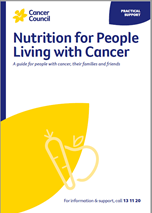- Home
- Cancer Information
- Living well
- Nutrition and cancer
- The importance of eating well
The importance of eating well
You may know that eating well is important for your overall health and wellbeing, but not be aware of all the benefits.
Learn more about:
What are the benefits of good nutrition?
Good nutrition can:
- give you more energy and strength
- help you achieve or maintain a healthy weight
- improve your mood
- help prevent or reduce the risk of some conditions, such as heart disease, type 2 diabetes and even some cancers.
What to eat
The Australian Dietary Guidelines provide advice on eating for health and wellbeing for the general population. They were developed by the National Health and Medical Research Council (NHMRC).
Below we outline the key recommendations from the guidelines. Following these guidelines will help ensure you eat well and may reduce your risk of developing some cancers. It is also important to be as physically active as possible.
What to drink
Fluids are essential for the body to function. All the organs, tissues and cells in your body need fluids to keep working properly.
As a general guide, you should aim to drink at least 8–10 glasses of fluid per day. Most of this should be plain water, but fluid from soups, smoothies, milk, fruit juices, or ice cubes is also good. Tea and coffee also provide fluid, but they may cause you to urinate (pee) more often.
Alcohol may lead to weight gain and increase the risk of heart disease, type 2 diabetes and several cancers, such as bowel and breast. When it comes to cancer risk, there is no safe level of alcohol consumption.
For healthy people who choose to drink alcohol, Cancer Council recommends you follow the NHMRC guidelines and have no more than 10 standard drinks a week and no more than 4 standard drinks on any one day.
What to eat and drink during cancer treatment
Cancer and its treatment both place extra demands on the body.
Research shows that eating well before, during and after cancer treatment can help:
- improve quality of life by giving you more energy, keeping your muscles strong, helping you stay a healthy weight, and boosting mood
- your body cope with the side effects of treatment, improve how well treatment works, reduce length of hospital stays, and speed up recovery
- heal wounds and rebuild damaged tissues after surgery, radiation therapy, chemotherapy and other treatments
- improve your immune system and ability to fight infections
- reduce the risk of cancer coming back (recurrence).
During treatment, the side effects of cancer and its treatment may make it hard to eat enough or you may have trouble eating some foods.
You may need to be more flexible with what you eat. This may mean that the foods you are able to eat are quite different to those in your normal diet and perhaps not foods that are recommended as part of a healthy diet.
How to eat well after a cancer diagnosis explains how your food choices may be different from the Australian Dietary Guidelines before, during and after cancer treatment.
Alcohol can also interact with some medicines. Check with your doctors before drinking wine, beer or spirits during cancer treatment.
→ READ MORE: General guidelines for healthy eating
Video: How to eat well after a cancer diagnosis
Podcast: for people affected by cancer
Listen now
More resources
Jacqueline Baker, Senior Oncology Dietitian, Chris O’Brien Lifehouse, NSW; Lauren Atkins, Advanced Accredited Practising Dietitian, OnCore Nutrition, VIC; Dr Tsien Fua, Head and Neck Radiation Oncology Specialist, Peter MacCallum Cancer Centre, VIC; Rosemerry Hodgkin, 13 11 20 Consultant, Cancer Council WA; Clare Hughes, Manager, Nutrition Unit, Cancer Council NSW; John Spurr, Consumer; Emma Vale, Senior Dietitian, GenesisCare, SA; David Wood, Consumer.
View the Cancer Council NSW editorial policy.
View all publications or call 13 11 20 for free printed copies.
Need to talk?
Support services
Exercise and cancer
Exercise has many benefits both during and after cancer treatment, helping with side effects, speeding up recovery, and improving quality of life
Need legal and financial assistance?
Pro bono services, financial and legal assistance, and no interest loans
Cancer information
What is cancer?
How cancer starts and spreads
Relaxation and meditation podcast
Listen to our podcast to learn the best ways to meditate and relax, which can help people affected by cancer

